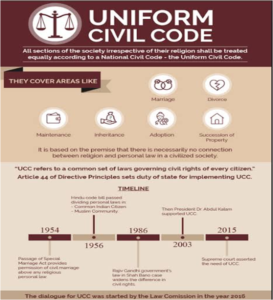
Uniform Civil Code
- The concept of a standard set of civil laws for all citizens of a country, regardless of religious or cultural ties, is referred to as the standard Civil Code.
- A UCC would provide for one law for the entire country, applicable to all religious communities, in their personal matters such as marriage, divorce, inheritance, adoption etc.
- In other words, UCC is a set of rules/regulations, which proposes to replace the personal laws based on the scriptures and customs of each major religious community in the country with a common set governing every citizen.

Current situation in India
- Currently, Indian personal law is fairly complex, with each religion adhering to its own specific laws.
- Separate laws/ customs govern Hindus, Sikhs, Jains and Buddhist, Muslims, Christians, and followers of other religions.
- Moreover, there is diversity even within communities. All Hindus of the country are not governed by one law, nor are all Muslims or all Christians.
- For example, in the Northeast, there are more than 200 tribes with their own varied customary laws.
- The Constitution itself protects local customs in Nagaland. Similar protections are enjoyed by Meghalaya and Mizoram.
- The exception to this rule is the state of Goa, where all religions have a common law regarding marriages, divorces, and adoption.
Constitutional position
– Article 44 of the Constitution lays down that the state shall endeavour to secure a UCC for citizens throughout the territory of India.
- Article 44 is among the Directive Principles of State Policy.
- Directive Principles are not enforceable by court, but are supposed to inform and guide governance.
Please read- Shah Bano judgement
Stand of the 21st Law Commission on the matter
- In 2018, 21st Law Commission underlined that the Uniform Civil Code is neither necessary nor desirable at this stage.
- It argued for reform of family laws of every religion through amendments and codification of certain aspects so as to make them gender-just.
- It further said that cultural diversity cannot be compromised to the extent that our urge for uniformity itself becomes a reason for threat to the territorial integrity of the nation.
Need for UCC
- To promote national unity
- Different personal laws are put to subversive use
- Gender justice and Equality
- Not in the domain of religious activities
- Simplification and Rationalization of legal system
- Vision of constitution makers
Arguments against UCC
- Diversity cannot be compromised for uniformity
- Violation of fundamental rights
- Constitution recognises the customary laws and procedures prevailing in NE states
- Detrimental to communal harmony of India
SC-related cases:
| Landmark Cases | Ruling and Implications |
| Shah Bano Case (1985) | The Supreme Court upheld the right of a Muslim woman to claim maintenance from her husband even after the Iddat period. |
| It highlighted the need for a UCC to remove contradictions based on ideologies. | |
| Sarla Mudgal (1995) | The Supreme Court stated that a Hindu husband cannot convert to Islam and marry without dissolving his first marriage. |
| It emphasized that a UCC would prevent fraudulent conversions and bigamous marriages. | |
| Shayara Bano case (2017) | The Supreme Court declared triple talaq as unconstitutional and violative of Muslim women’s dignity and equality. |
| It recommended that Parliament enact a law to regulate Muslim marriages and divorces. |